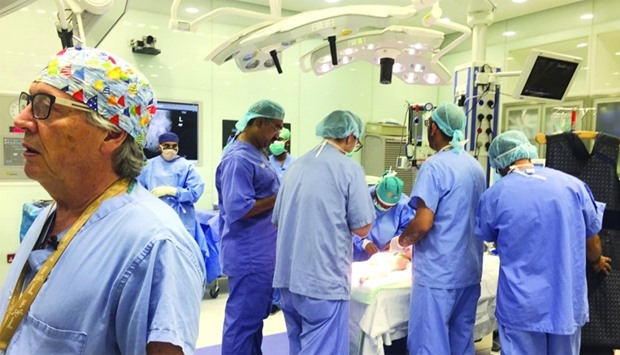Qatar has become one of the few countries in the world to provide highly complex urological surgeries on the strength of clinical expertise at Sidra Medical and Research Center (Sidra) and Hamad Medical Corporation (HMC).
Sidra announced the successful completion of two highly complex urological surgeries by Dr. Joao Luiz Pippi Salle – considered one of the few experts in the world specialised in bladder exstrophy surgery.
The life-altering surgeries were conducted on a 19-month old from Central Asia and a 17-month old from Ghana. Both patients and their families were flown to Qatar thanks to the combined efforts of Qatar Foundation (QF), the Association for Bladder Exstrophy Community (A-BE-C), Sidra and HMC.
Commenting on the children’s progress, Dr. Salle said the first phase of the children’s surgeries has been successful and they are now out of intensive care.
"The children and their families have been very brave given the stress and endurance in the lead up to the surgeries and post recovery process. One of the patients also required orthopedic reconstruction of the pelvic bones. The children are still under observation and will be in the recovery unit for the next several weeks; this is where we will monitor their bladder function and ensure that they are healing. Their care however will be ongoing and could potentially involve more surgeries and procedures in the future.”
Bladder exstrophy is a rare urological disease that affects 1 in 50,000 babies. Depending on the type of exstrophy, patients can be born with complex urological structures including a malformation of the bladder and improperly formed pelvic bones. Repair of the exstrophied bladder requires surgical reconstruction which can be highly complex. A child with exstrophy may undergo multiple surgical procedures, associated lengthy hospitalisations and many repeated outpatient visits and treatments.
The complex surgeries were conducted at Hamad Hospital by a medical team comprising Sidra and HMC paediatric surgeons and anesthesiologists. Both children’s surgeries took close to eight hours. The urological team headed by Dr. Salle included HMC doctors Abdelrrhaman El Khadi, Sami Cherigui and Tariq Abbas. For the child requiring pelvic bone surgery, this was performed by Sidra’s division chief of pediatric orthopaedics, Dr. Jason Howard. The second child’s surgery involved a general pediatric surgical team led by HMC’s Dr. Mansour Ali.
Sidra chief executive officer, Peter Morris said: “We are immensely proud of the team at Sidra and the humanitarian role we have been able to play in changing the lives of these two wonderful and brave children. Our joint medical collaboration with HMC is also testament to the network of care that continues to advance in Qatar with the help of Qatar Foundation. ”
According to the A-BE-C, a treatable condition like bladder exstrophy can potentially become critical, particularly for children who do not have access to proper medical care. Many of these children can spend years in agonising pain and shunned by family and society. Pamela Block, Executive Director of A-BE-C and a mother of a child who had bladder exstrophy, arranged for the children and families to come to Qatar and provided support and hope to the families during the surgeries at Hamad Hospital.
She thanked Mchail C Chebab from HMC who helped the families with their paper work and continues to provide ongoing support to them during their stay.
"After seeing the world-class team and facilities in Qatar, I am optimistic it will set a precedence for Sidra to become a global referral center for specialized pediatric urological treatment. The amount of time, cost and stress it will save for families who live in close proximity to Qatar including countries in Africa, Asia and Europe will be immense,” said Block.
After the children recover from the first stage of their surgeries, they will return to their home countries where they will be monitored by local doctors in collaboration with the A-BE-C. They will return to Qatar for additional procedures related to enabling urinary continence and receiving psycho-social support.

